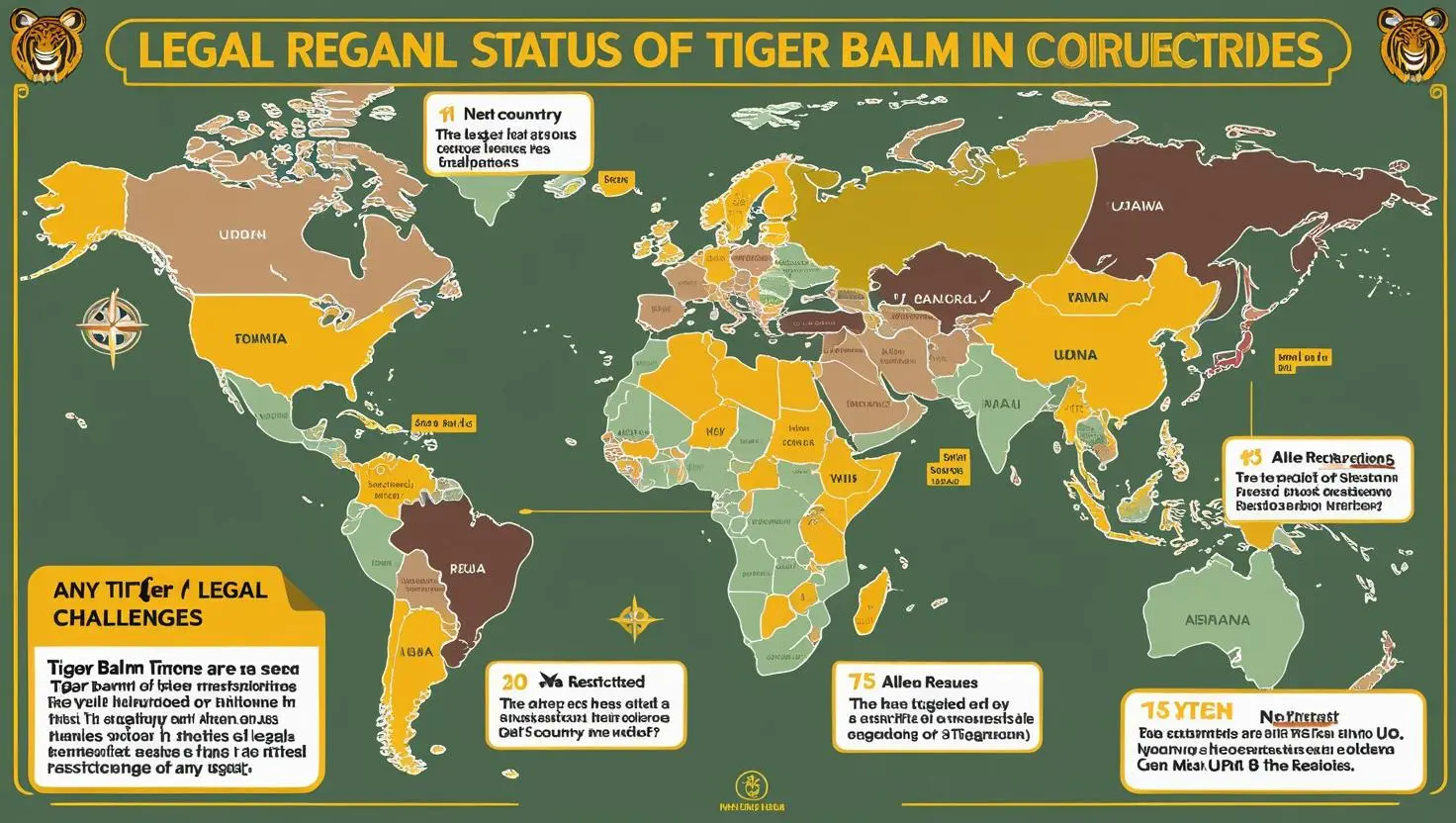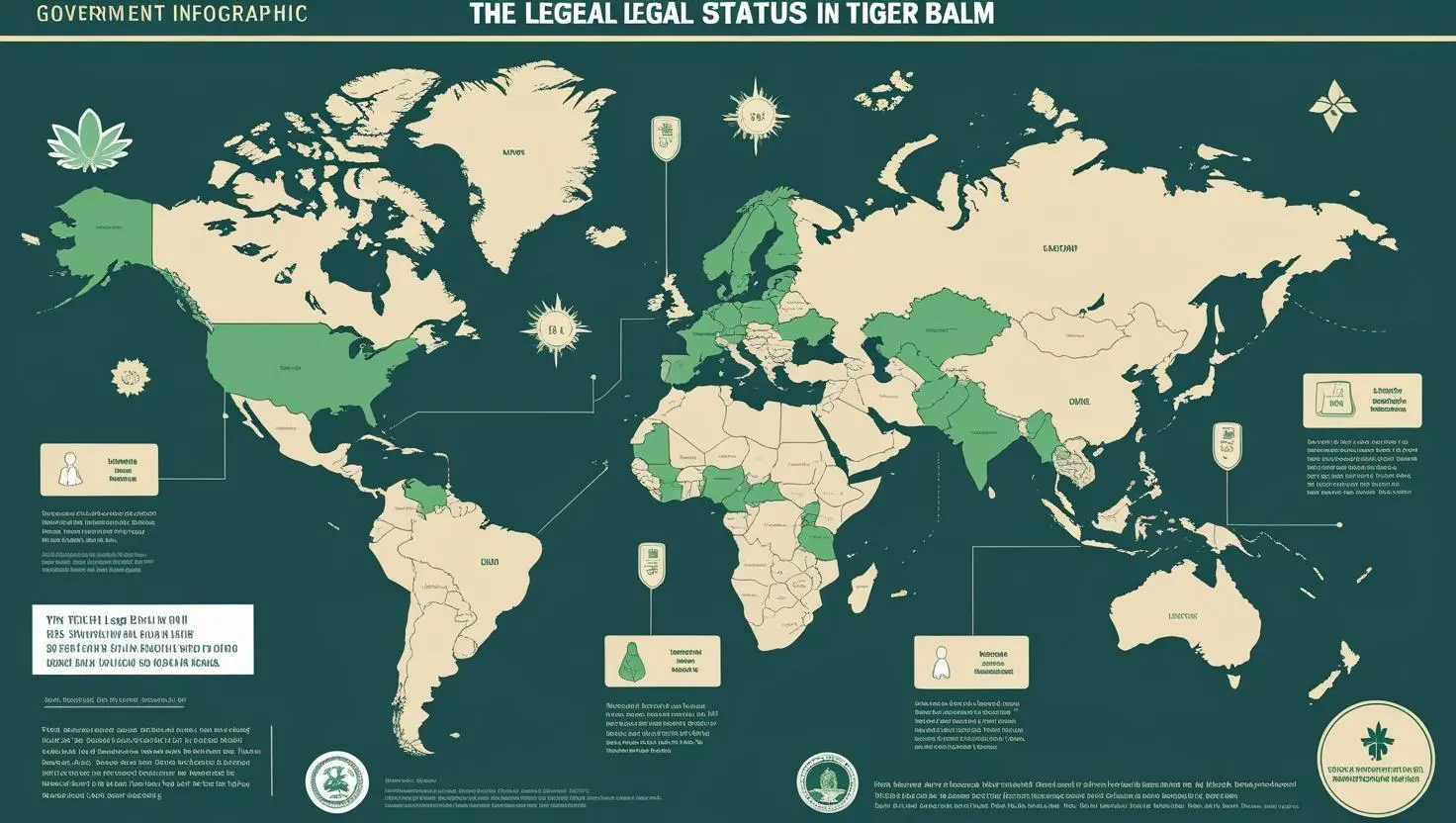Tiger Balm is a household name for millions around the world. Known for its soothing relief of aches and pains, this herbal ointment has been trusted for generations.
But if you’ve heard whispers about Tiger Balm being illegal, you might be confused. Why is Tiger Balm illegal in some places? Is it really banned everywhere? Let’s dive into the facts, clear up the confusion, and explore the real reasons behind the controversy.
The Origins of Tiger Balm
Tiger Balm’s story begins over a century ago in Burma, now known as Myanmar. Created by herbalists Aw Chu Kin and his sons, this balm quickly became famous for its unique blend of natural ingredients.
Camphor, menthol, cajuput oil, and clove oil are the main stars, working together to provide that signature cooling sensation.
Over time, Tiger Balm spread across Asia and then the world, becoming a staple in medicine cabinets for muscle pain, headaches, and even insect bites.
Why Is Tiger Balm Illegal in Some Countries?
The question “why is Tiger Balm illegal” pops up often, especially in online forums and travel blogs. The truth is, Tiger Balm is not universally illegal. In fact, it’s widely available in most countries.
However, there are specific regions where certain ingredients in Tiger Balm are restricted or regulated. This doesn’t mean the product itself is inherently dangerous or banned everywhere. Instead, it’s about local laws and health regulations.
Ingredient Restrictions and Local Laws
One of the main reasons Tiger Balm faces restrictions is due to its ingredients. Camphor and menthol, while natural, are regulated in some countries.
For example, in the United States, the Food and Drug Administration (FDA) limits the concentration of camphor in over-the-counter products.
If a product exceeds this limit, it can’t be sold legally. Some versions of Tiger Balm, especially those made for export, are reformulated to comply with these rules.
In other countries, certain herbal oils used in Tiger Balm may be considered allergens or potential irritants. Health authorities might restrict their use to protect sensitive populations, such as children or pregnant women.
This is not unique to Tiger Balm; many traditional remedies face similar scrutiny as governments work to balance public safety with cultural practices.
Misunderstandings and Misinformation
The idea that Tiger Balm is illegal everywhere is a myth. Often, stories about Tiger Balm being banned come from misunderstandings or outdated information.
For example, a traveler might have their Tiger Balm confiscated at an airport due to local customs rules, leading them to believe it’s illegal in that country. In reality, it might just be a matter of labeling, packaging, or ingredient concentration.
Social media can also amplify these stories, spreading confusion. It’s important to check official sources and local regulations before traveling with any medicinal product, including
Tiger Balm. Most of the time, you’ll find that it’s perfectly legal to use and carry, as long as you follow the rules.
Tiger Balm and International Travel
If you’re planning to travel and want to bring Tiger Balm with you, it’s wise to do a little research first. Some countries have strict rules about importing medicines, even over-the-counter ones.
Always check with the embassy or health authority of your destination. In most cases, carrying a small amount for personal use is allowed, but large quantities might raise questions.
It’s also a good idea to keep Tiger Balm in its original packaging. This helps customs officials identify the product and see that it’s a legitimate, commercially produced item.
If you have a prescription or doctor’s note explaining why you use Tiger Balm, bring that along too. These simple steps can help you avoid misunderstandings at the border.
Health and Safety Concerns
Why is Tiger Balm illegal in some places? Health and safety are the main reasons. Camphor, one of the key ingredients, can be toxic if ingested in large amounts.
This is why many countries have strict rules about how much camphor can be included in over-the-counter products. For adults using Tiger Balm as directed, the risk is very low. But for children, especially those under two years old, camphor can be dangerous.
Some people may also experience skin irritation or allergic reactions to the oils in Tiger Balm. If you have sensitive skin or a history of allergies, it’s wise to test a small amount first.
Always follow the instructions on the label and avoid using Tiger Balm on broken skin or near the eyes and mouth.
The Role of Traditional Medicine
Tiger Balm is more than just a pain reliever; it’s a symbol of traditional medicine. In many Asian cultures, herbal remedies like Tiger Balm are passed down through generations.
They’re trusted for their natural ingredients and time-tested effectiveness. However, as these products become popular worldwide, they must meet the safety standards of each country.
This can lead to confusion when a product that’s common in one country is restricted in another. It’s not about the product being “bad” or “illegal” everywhere. Instead, it’s about making sure that all medicines, traditional or modern, are safe for everyone.

Alternatives to Tiger Balm
If you find that Tiger Balm is restricted where you live or travel, don’t worry. There are many alternatives available. Look for products with similar ingredients, such as menthol or eucalyptus oil.
Many pharmacies offer their own versions of pain-relief balms that meet local regulations. You can also try natural remedies like warm compresses, gentle stretching, or essential oils for minor aches and pains.
Remember, always check the ingredients and follow the instructions. If you have any concerns about allergies or interactions with other medications, talk to a healthcare professional.
The Future of Tiger Balm
Despite the occasional controversy, Tiger Balm remains a beloved remedy for millions. Manufacturers continue to adapt their formulas to meet the changing rules of different countries.
This means you might see slightly different versions of Tiger Balm depending on where you buy it. The core promise, however, stays the same: fast, soothing relief from everyday aches and pains.
As global interest in natural and traditional remedies grows, products like Tiger Balm are likely to remain popular. The key is to stay informed, use them safely, and respect local laws.
Clearing Up the Confusion
So, why is Tiger Balm illegal in some places? The answer is a mix of ingredient regulations, health concerns, and local laws. It’s not a global ban, and in most countries, Tiger Balm is perfectly legal and safe to use.
The best way to avoid problems is to check the rules before you travel or buy. Use Tiger Balm as directed, and enjoy the relief it brings.
If you ever have doubts, consult a pharmacist or healthcare provider. They can help you find the right product for your needs and make sure you’re using it safely.
Conclusion: The Real Story Behind Tiger Balm’s Legal Status
Tiger Balm’s reputation as a trusted pain reliever is well-earned. While it faces restrictions in some places due to ingredient regulations, it is not universally illegal. Most people can use Tiger Balm safely and legally by following local guidelines and using the product as intended.
The next time you hear someone ask, “why is Tiger Balm illegal?” you’ll know the real story. It’s about safety, not scandal. With a little knowledge and care, you can continue to enjoy the benefits of this time-honored remedy wherever you are.
